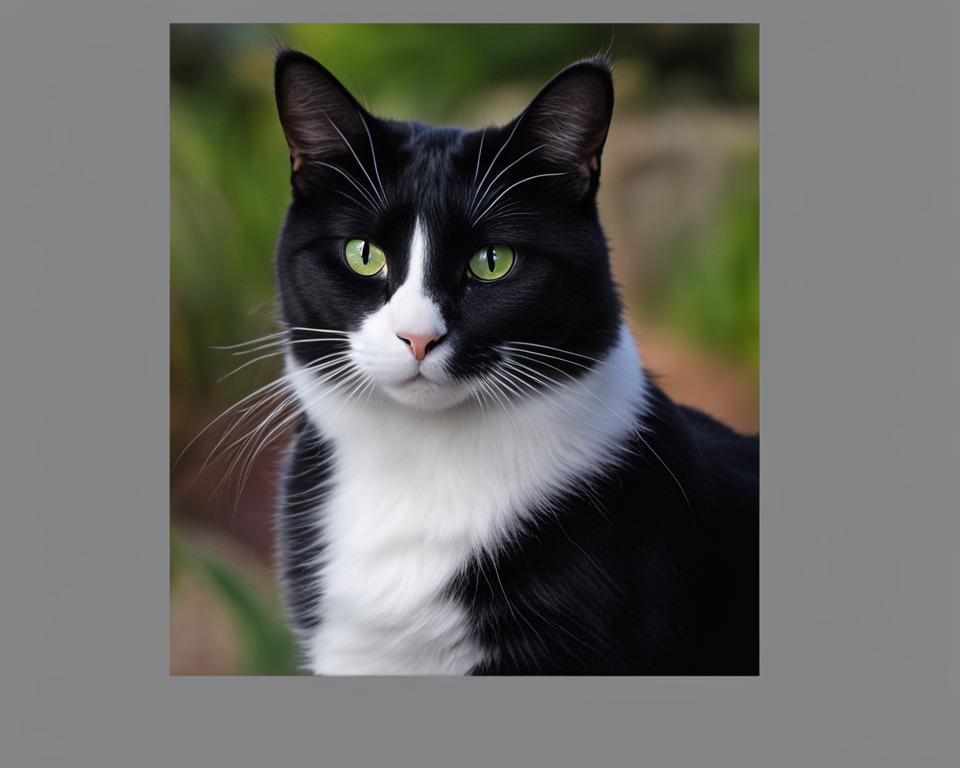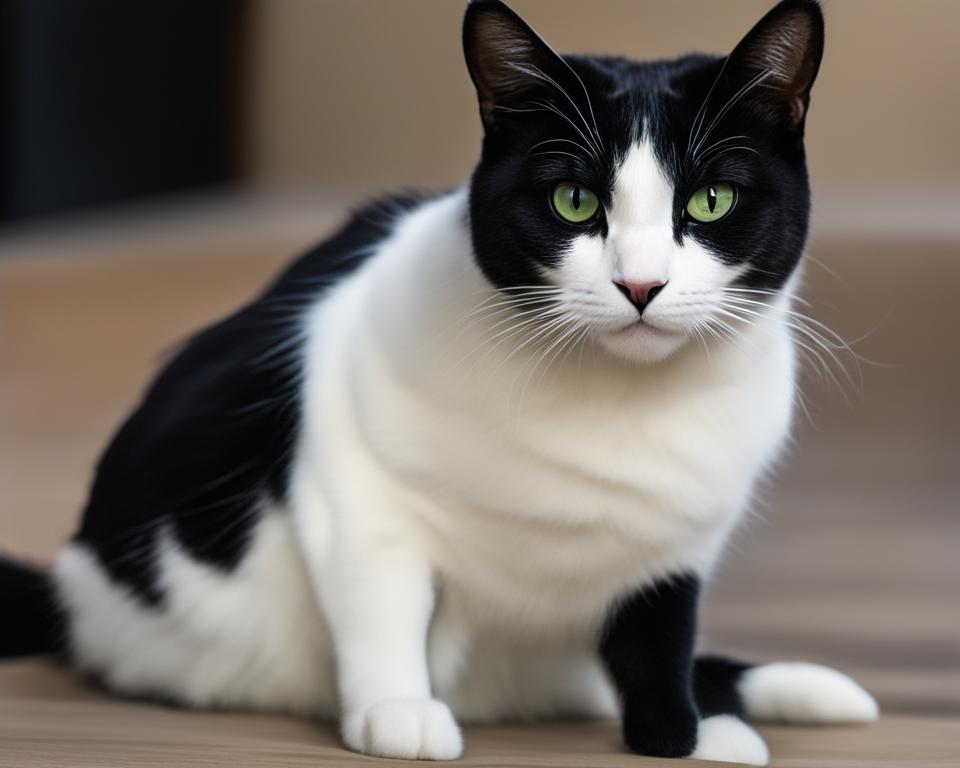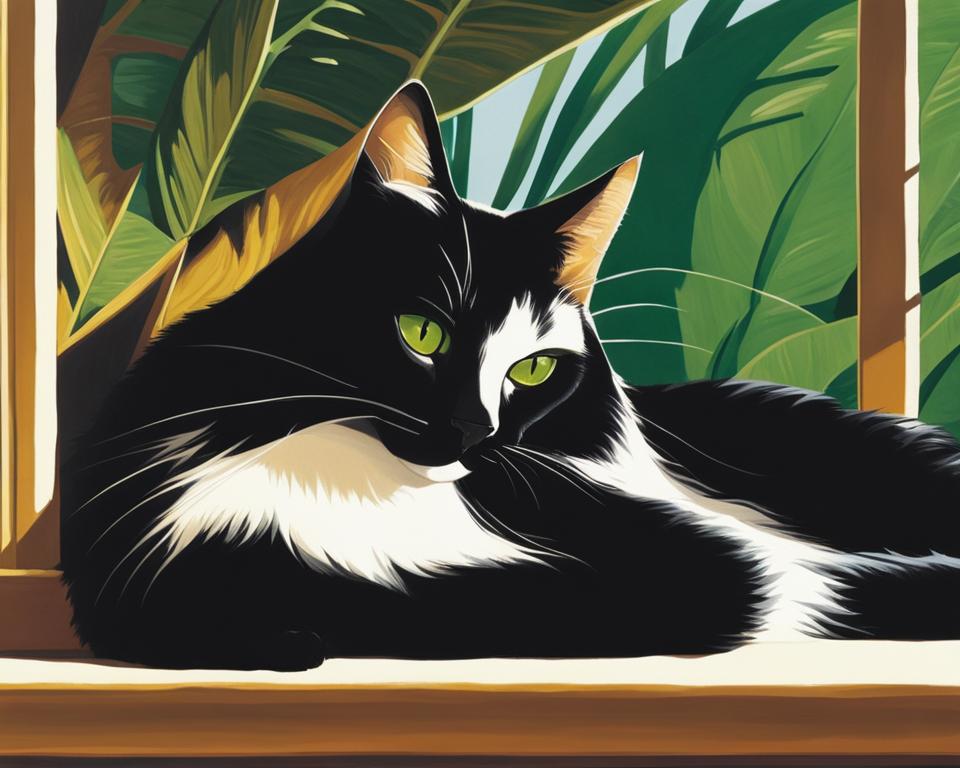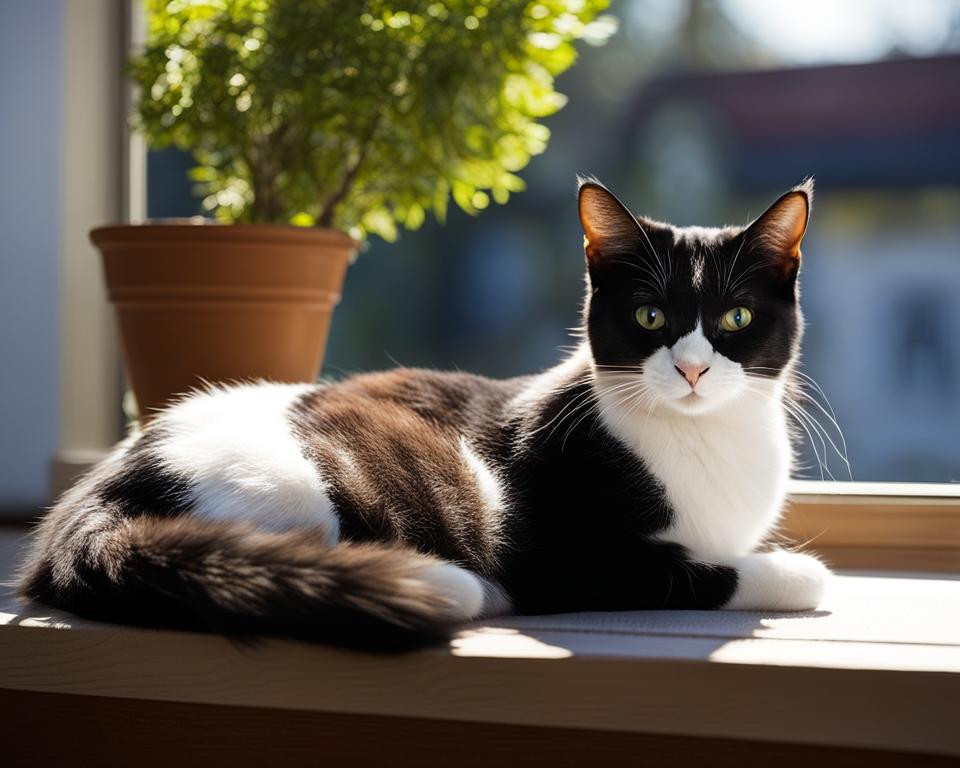Tuxedo cats, named for their formal black and white coat pattern, are not a specific breed but can be found in various breeds such as Maine Coon, British Shorthair, Scottish Fold, American Shorthair, and Turkish Angora. Tuxedo cats have a unique appearance due to their bicolor coat, which is the result of genetics rather than slow pigment cells. These cats are known for their friendly and affectionate nature, often described as dog-like. While tuxedo cats can live between 10 to 20 years when kept indoors, outdoor cats have a shorter lifespan of about 5 years. It’s important to note that tuxedo cats are not necessarily more intelligent than other cats, but they are often described as smart and easy-going.
Key Takeaways:
- Tuxedo cats have a distinctive black and white coat pattern.
- They are known for their friendly and affectionate nature.
- Indoor tuxedo cats can live between 10 to 20 years.
- Outdoor tuxedo cats have a shorter lifespan of about 5 years.
- Tuxedo cats are often described as smart and easy-going.
The Personality and Temperament of Tuxedo Cats
Tuxedo cats are known for their easy-going temperament and friendly nature. They are often playful, talkative, and loyal, with some cat owners even describing them as dog-like.
Tuxedo kittens are born with their distinctive coat pattern and tend to be more laid-back than other kittens. They are known to develop quickly and often open their eyes 24 hours earlier than other kittens.
Tuxedo cats tend to get along well with other household cats and form strong attachments with their owners. Their friendly and sociable nature makes them great companions for families and individuals alike.

Personality Traits of Tuxedo Cats:
- Easy-going
- Playful
- Talkative
- Loyal
- Sociable
- Friendly
Additional Facts About Tuxedo Cats:
- Tuxedo kittens are more laid-back than other kittens.
- Tuxedo cats develop quickly and open their eyes earlier.
- Tuxedo cats get along well with other household cats.
- Tuxedo cats form strong attachments with their owners.
Tuxedo Cat Temperament vs. Other Cat Breeds:
| Cat Breed | Temperament |
|---|---|
| Tuxedo Cats | Easy-going, friendly, and sociable |
| Siamese Cats | Intelligent, vocal, and social |
| Persian Cats | Calm, gentle, and independent |
| Maine Coon Cats | Playful, friendly, and adaptable |
| Bengal Cats | Energetic, curious, and affectionate |
Understanding the Appearance of Tuxedo Cats
Tuxedo cats have a unique black and white coat pattern, often described as a tuxedo jacket. This distinctive coat pattern can vary in terms of the amount of white and black fur, but it typically includes white markings on the paws, chest, throat, and belly. The black fur forms a “jacket” pattern over the back, with the white fur creating a stark contrast. This striking appearance is what gives tuxedo cats their name.
It’s important to note that tuxedo cats can have both short or long hair, depending on their breed. For example, a tuxedo Maine Coon cat will have a dense and fluffy coat, while a tuxedo British Shorthair cat will have a sleek and dense coat. The coat pattern can be seen in various breeds, showcasing the unique genetics behind this distinct appearance. Regardless of the length of their fur, tuxedo cats are undeniably captivating and elegant.
When it comes to tuxedo cats, their appearance goes beyond their coat pattern. They have a pair of bright and expressive eyes, which can come in different colors such as green, gold, or blue. Their ears are often pointed and alert, adding to their charming features. Tuxedo cats also tend to have a medium to large build, with strong and muscular bodies. Their overall appearance exudes grace and sophistication, making them a favorite among cat lovers.

Overall, the appearance of tuxedo cats is a combination of their striking black and white coat pattern, their expressive eyes, and their well-proportioned bodies. These unique features make them truly stand out and capture the hearts of those who encounter them.
Famous Tuxedo Cats in History and Pop Culture
Tuxedo cats have left their pawprints in history and have become iconic figures in popular culture. These feline fashionistas have been featured in various forms of media, showcasing their distinctive black and white coat pattern. From ancient art to modern-day entertainment, tuxedo cats have captured the hearts of people around the world.
Feline Royalty and Famous Owners
Tuxedo cats have been revered throughout history and have adorned the homes of renowned individuals. In ancient Egypt, these elegant cats were often depicted in art, symbolizing prosperity and good luck. Famous historical figures such as William Shakespeare, Ludwig van Beethoven, and Sir Isaac Newton were proud owners of tuxedo cats, appreciating their beauty and companionship.
Pop Culture Icons
Tuxedo cats have also made their way into pop culture, leaving a lasting impression on audiences. One of the most recognizable tuxedo cats is Sylvester from the beloved Looney Tunes cartoons. With his never-ending pursuit of Tweety Bird, Sylvester has become an iconic character loved by fans of all ages. Another popular feline is Felix the Cat, a mischievous and clever tuxedo cat who starred in his own animated series. Both Sylvester and Felix have become cultural icons, capturing the playful and adventurous spirit of tuxedo cats.
Literary References
Tuxedo cats have also found their way into literature, captivating readers with their charm. In T.S. Elliot’s “Old Possum’s Book of Practical Cats,” these cats are referred to as Jellicles, connecting their mystique and allure to the world of poetry. Andrew Lloyd Webber’s musical adaptation, “Cats,” further immortalized tuxedo cats on the stage, showcasing their elegance and grace.
Whether it’s through ancient art, famous owners, or popular culture, tuxedo cats have cemented their place in history and continue to captivate our imaginations. These sophisticated felines are a testament to the timeless appeal of their unique coat pattern and the undeniable charm they bring to our lives.
Health Considerations for Tuxedo Cats
Tuxedo cats, like all cats, require proper health care to ensure their well-being. While tuxedo cats are not prone to specific health problems related to their coat pattern, it’s important for owners to be aware of common health concerns that can affect cats in general. Regular veterinary check-ups, vaccinations, and preventive care are essential in maintaining the health of your tuxedo cat.
Grooming and Dental Care
Grooming plays a crucial role in keeping your tuxedo cat’s coat healthy and preventing matting. Regular brushing helps remove loose hair, reduce shedding, and prevent hairballs. Additionally, tuxedo cats may benefit from dental care as oral health issues such as dental decay and gum disease can also affect their overall well-being. Regular brushing, dental treats, and occasional professional dental cleanings can help maintain your cat’s oral hygiene.
| Common Health Problems | Symptoms | Prevention and Treatment |
|---|---|---|
| FIV (Feline Immunodeficiency Virus) | Lethargy, weight loss, recurrent infections | Vaccination, avoiding exposure to infected cats |
| Cancer | Unexplained weight loss, abnormal growths, changes in behavior | Early detection through regular vet check-ups, treatment options vary |
| Diabetes | Increased thirst, frequent urination, weight loss | Proper diet, regular exercise, medication if necessary |
| Obesity | Excessive weight gain, difficulty moving, joint problems | Controlled portion sizes, regular exercise, balanced diet |
| Internal Parasites | Vomiting, diarrhea, weight loss, visible worms in feces | Regular deworming, flea control, proper hygiene |
Recognizing Signs of Illness
- Changes in appetite or water intake
- Lethargy or decreased activity levels
- Changes in litter box habits
- Weight loss or gain
- Visible signs of discomfort or pain
- Changes in grooming habits
If you notice any of these symptoms or any other changes in your tuxedo cat’s behavior, it’s important to consult a veterinarian. Early detection and treatment can greatly improve the prognosis for many health conditions.

Fun Facts and Trivia About Tuxedo Cats
Tuxedo cats have a fascinating history and are associated with numerous interesting facts and trivia. These distinctive felines have been depicted in ancient Egyptian art, where they were believed to bring luck and prosperity. Throughout the ages, tuxedo cats have also found themselves in the company of famous individuals such as Shakespeare, Beethoven, and even former President Bill Clinton, who had a tuxedo cat named Socks as a pet.
Not only have tuxedo cats left their mark in history, but they have also made a significant impact on popular culture. Some iconic cartoon characters, like Sylvester the Cat from Looney Tunes and Felix the Cat, feature the distinctive tuxedo coat pattern. Tuxedo cats have also graced the pages of literature, with references in T.S. Eliot’s “Old Possum’s Book of Practical Cats” and Andrew Lloyd Webber’s renowned musical, “Cats”.
These intelligent and charismatic cats have even been associated with extraordinary achievements. Legend has it that tuxedo cats accompanied Viking explorations and even climbed Mount Everest. While these claims may be more folklore than fact, they speak to the enduring fascination and allure of these captivating felines.
FAQ
Are tuxedo cats a specific breed?
No, tuxedo cats are not a specific breed. They can be found in various breeds such as Maine Coon, British Shorthair, Scottish Fold, American Shorthair, and Turkish Angora.
What is the lifespan of a tuxedo cat?
Tuxedo cats can live between 10 to 20 years when kept indoors. However, outdoor cats have a shorter lifespan of about 5 years.
Are tuxedo cats more intelligent than other cats?
Tuxedo cats are not necessarily more intelligent than other cats. However, they are often described as smart and easy-going.
What is the unique appearance of tuxedo cats?
Tuxedo cats have a black and white coat pattern, often described as a tuxedo jacket. This pattern includes white markings on the paws, chest, throat, and belly.
What health issues can tuxedo cats experience?
Common health issues for tuxedo cats can include FIV (Feline Immunodeficiency Virus), cancer, diabetes, obesity, dental decay, and internal parasites.
Are tuxedo cats good with other pets?
Tuxedo cats tend to get along well with other household cats and can form strong attachments with their owners.
Do tuxedo cats have any historical or pop culture significance?
Tuxedo cats have been featured in ancient Egyptian art and have been owned by famous individuals such as Shakespeare, Beethoven, and Sir Isaac Newton. They have also appeared in cartoons and movies, including Sylvester the Cat from Looney Tunes and Felix the Cat.
What are some interesting facts about tuxedo cats?
Tuxedo cats have a rich history and have been associated with good luck in ancient Egyptian culture. They have been credited with climbing Mount Everest and joining Viking explorations. They are often referred to as Jellicles in T.S. Elliot’s book and have made various cultural references.

Leave a Reply